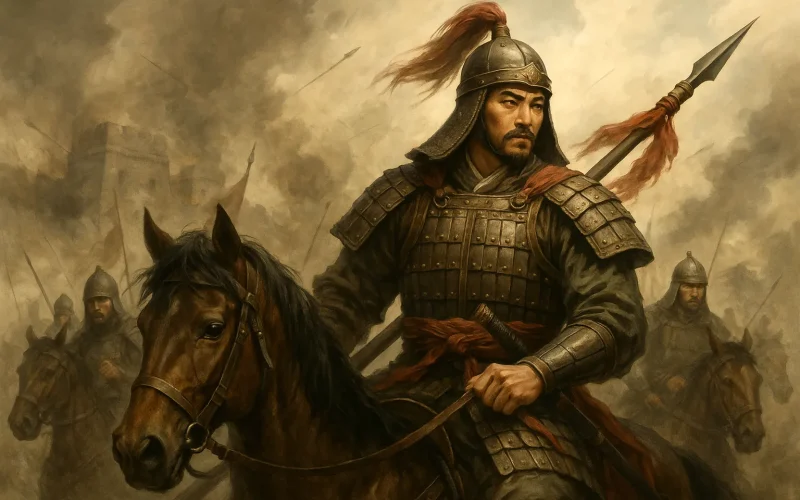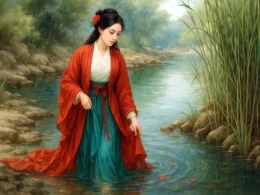In summer sky-high mountains white with snow,
In bitter cold no fragrant flowers blow.
Songs on the flute are heard of Willows Green,
But nowhere is the vernal color seen.
From dawn till dusk to beats of drums they fight;
With saddle in their arms they rest at night.
From scabbard at my waist I'd draw my sword
To kill the chieftain of the Turki horde.
Original Poem
「塞下曲 · 其一」
李白
五月天山雪,无花只有寒。
笛中闻折柳,春色未曾看。
晓战随金鼓,宵眠抱玉鞍。
愿将腰下剑,直为斩楼兰。
Interpretation
"Frontier Son" represents Li Bai's adaptation of the traditional Yuefu ballad form, comprising six poems with this being the first. Composed during his early travels, though not based on personal frontier experience, these poems vividly capture his imaginative yearning for border life and reflect the martial spirit and aspirational ethos of the High Tang era. Through concise artistry, this piece portrays frontier soldiers' collective loyalty and courage in harsh environments.
First Couplet: "五月天山雪,无花只有寒。"
Wǔyuè Tiānshān xuě, wú huā zhǐyǒu hán.
Tianshan snows in May still lie; No flowers, only bitter cold.
The opening creates stark temporal-spatial dissonance, highlighting the frontier's extreme conditions. While inland China enjoys summer warmth in May, Tianshan remains snow-covered—not merely geographical fact but emphasis on soldiers' harsh reality. "No flowers, only cold" strips away all warmth and beauty in five characters, establishing the poem's austere, vigorous tone.
Second Couplet: "笛中闻折柳,春色未曾看。"
Dí zhōng wén zhé liǔ, chūnsè wèicéng kàn.
Willow-breaking songs drift from flutes; Spring's colors these eyes never see.
This couplet deepens emotional resonance. "Willow-breaking song" (折柳) was a Yuefu melody of farewell, evoking homesickness through sound; "never seeing spring" represents tangible deprivation. Their juxtaposition reveals soldiers' dual plight—spiritual longing amid material scarcity—with profound subtlety.
Third Couplet: "晓战随金鼓,宵眠抱玉鞍。"
Xiǎo zhàn suí jīn gǔ, xiāo mián bào yù ān.
Dawn battles follow drums' command; Night's rest hugs the jeweled saddle.
With concentrated power, this couplet outlines soldiers' tense existence. "Dawn" and "night" encompass daily campaigning rigors. "Follow drums' command" depicts military discipline and unified action; "hug the saddle" vividly portrays sleeping in armor, alert and ready—one of frontier poetry's most expressive details.
Fourth Couplet: "愿将腰下剑,直为斩楼兰。"
Yuàn jiāng yāo xià jiàn, zhí wèi zhǎn Lóulán.
I'd draw the sword at my waist, To strike down Loulan foes outright.
The conclusion turns abruptly, erupting with patriotic fervor after hardships piled high. "I'd draw" and "strike outright" convey resolute volunteerism. "Strike down Loulan" alludes to Fu Jiezi's Han-dynasty feat of neutralizing a hostile kingdom, expressing lofty ambition to pacify frontiers—climaxing the poem with militant resolve.
Holistic Appreciation
The poem's structure follows a purposeful "buildup-release" pattern. The initial six lines develop imagery of "severe cold" and "hardship": the unforgiving environment, demanding daily life, and profound homesickness. This progressive accumulation makes the final couplet's emotional outbreak powerfully believable and affecting. The work thus illustrates that High Tang frontier spirit was not naive optimism but valor that acknowledges difficulty yet resolves to move forward.
Artistic Merits
- Masterful Contrast: Inland May vs. Tianshan snow, flute songs of spring vs. actual springlessness, dawn battles vs. perilous night rest—multilayer contrasts build momentum for the climax.
- Expressive Detail: "Hug the saddle" speaks volumes about tense hardship and loyalty with unmatched vividness.
- Strategic Allusion: "Strike down Loulan" uses historical precedent (Han dynasty) to express Tang aspirations, adding depth and subtlety.
- Vigorous Language: The poem's robust diction—"cold," "battle," "strike"—eschews softness, matching frontier themes and heroic tone with phonetic force.
Insights
The poem's core spirit is sublime character that recognizes adversity yet chooses responsibility and self-transcendence. True courage stems not from ignoring difficulty but from acknowledging it and undertaking duty proactively. This remains relevant today—facing personal challenges or social responsibilities, we need this "dawn battles follow drums" discipline and "strike outright" purposefulness, transforming hardship into motivation to advance toward higher ideals.
Poem translator
Xu Yuanchong(许渊冲)
About the poet

Li Bai (李白), 701 - 762 A.D., whose ancestral home was in Gansu, was preceded by Li Guang, a general of the Han Dynasty. Tang poetry is one of the brightest constellations in the history of Chinese literature, and one of the brightest stars is Li Bai.












